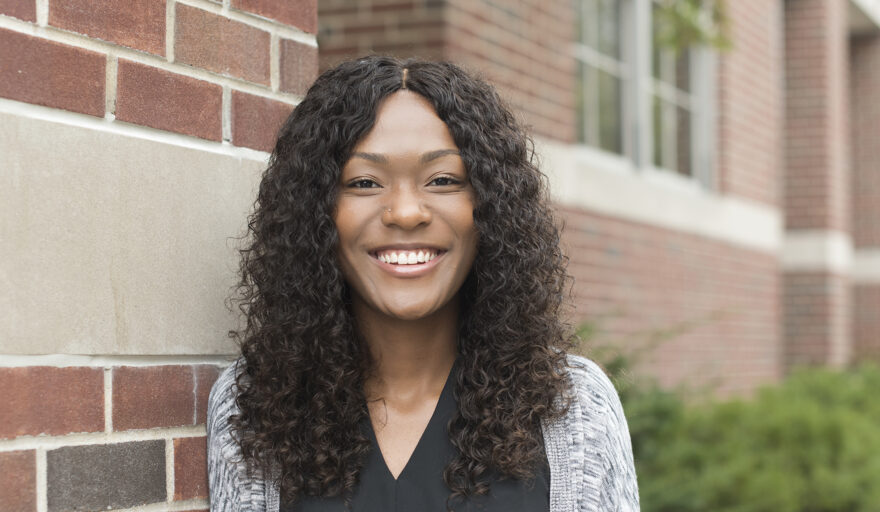A “Perfect Fit”
Brandie Bentley
PhD Candidate

Brandie Bentley has a diverse set of research interests—all of which dovetail perfectly in her work as a PhD candidate at the School of Social Work.
Brandie has long had interests in race, ethnicity, disability, and health, particularly within a family context.
And the School of Social Work, she found, is the ideal place to meld those interests together as she pursues her PhD.
“After earning my undergraduate degree, I applied to nine graduate programs in social work before deciding on the University of Illinois, which proved to be a perfect fit for me,” says Bentley, who also earned her MSW from Illinois in 2018. “It was the only school that was going to provide me with exactly what I needed to be successful.”
Her interests, in large part, stem from her own experience.
“In 2010 my father received a diagnosis of multiple sclerosis after months of displaying consistently progressive symptomology. My family falls at the intersection of multiple marginalized social locations (i.e., low income, Black, disability), that have impacted and molded my lived experiences. Coming to learn my identity in that sense, and then working with Dr. Karen Tabb [her advisor] on early childhood issues, it was a natural connection,” Bentley says. “I have an interest in disability research and I also find early childhood work very fascinating, so it was the perfect connection between all of my interests.”
For her first qualifying paper, she is focusing on racial disparities in the Early Intervention program, which operates through the Illinois Department of Human Services. The program offers services for children ages 0-3 who have developmental delays or disabilities in their families, Bentley says.
“I’m doing a literature review to explore existing literature, gaps, and areas where I can make the most impactful contributions,” she says. She is finding, she adds, disparities on both ends of the spectrum.
“Some articles say that children of color with delays and disabilities are being overrepresented in early intervention services, and others say they are being underrepresented,” Bentley notes. Experiences of multilevel oppression increase the rates of mothers of color who have children with delays and disabilities, she says. “There are racial disparities in birth outcomes for BIPOC communities who have historically been, and continually are, betrayed, neglected, and oppressed by the same systems intended to care for them. The research shows that for this reason, birthing populations of color have higher rates of preterm birth, which leads to higher risks of infant developmental delays or disabilities,” she says.
The presence of racial discrimination and ableism in the healthcare system, Bentley says, can demotivate BIPOC communities from engaging with early disability services. “Families of color are challenged with navigating this complex system that does not always have their best interests at heart. I think it’s incredibly fascinating and worth looking into more,” she notes.
Bentley believes early intervention is critical. “If these issues aren’t addressed early on, it can manifest into different disparities across the lifespan—health disparities and educational disparities,” she says. “We need to prioritize early childhood as an important period of individual and family intervention.”
Her own time at the School has been marked by steady support and encouragement from faculty and staff. “I love how the School encourages us to pursue opportunities both within the department and outside our department,” she says. “For me, because early intervention is an interdisciplinary program, I’ve been able to work in the social work lab and also in the special education lab.
“Across my entire time in the program, I’ve been able to gain a lot of insight into the research and programming that’s happening at the state level and also at the agency direct provider level, and I’ve had the experience of listening to parent interviews and understanding the parent perspective,” she says. “Gaining the perspectives of diverse stakeholders and being able to translate them across contexts is something I’m super grateful for, and something the School really motivates us to do. I have felt a really strong sense of care and nurturing and support at the School, academically, professionally, and personally.”
Bentley sees teaching and research in her future as a professor. “I want to push the bounds and bring my own personal style to research spaces,” she says. “I have a lot of ideas brewing. I definitely think there’s an opportunity to bring a more creative lens to the traditional research landscape.”